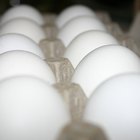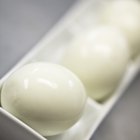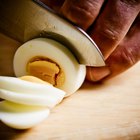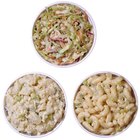arinahabich/iStock/GettyImages
Having Deviled Eggs and Eating Them Too
Whether you're getting ready to attend a pot luck or getting ready to throw your own party, preparing food in advance saves you time and anxiety. Luckily, crowd-pleasing deviled eggs fall readily into the make-ahead category – as long as you follow some basic guidelines. What's more, you have options when it comes to the methods for storing them safely in the fridge. Although whole hard boiled eggs last safely for up to one week in the refrigerator, deviled eggs have a shorter timeline for safe storage.
Store the Finished Deviled Eggs
A deviled egg will stay safe in a refrigerator, kept at 40F or below, for three to four days. However, the tops of the eggs may become dried out slightly and lose their soft texture and consistent pale yellow color. Wrap the platter of eggs in plastic wrap to minimize them drying out and to minimize the chances of the eggs taking on flavors or odors of other foods. Put toothpicks into a few of the eggs so the plastic wrap won't squish down the yolk toppings.
Separate the Deviled Egg Components Before Storing
If you will have some time before serving the deviled eggs, consider storing the whites and the yolks separately in the refrigerator. You can either mix the yolks with mayonnaise before storage or save that step as well for the day you plan to serve the finished product. While this method takes more time on the day you plan to serve the eggs, it has the advantage of keeping the filling for the deviled eggs fresher tasting and fresher looking than storing the eggs finished. Plus, it's easier to cover the filling, with plastic wrap or in a container, this way than it is to wrap the completed deviled eggs.
Checking the Eggs for Safety
When it comes to food safety, it's always better to err on the side of caution rather than to take risks of getting ill from food-borne bacteria. There's always the possibility that your refrigerator hasn't maintained a consistent 40F temperature, so if the eggs develop an off odor, a strange texture or color, or if you have any doubts about the safe condition of the eggs, throw them away.
Another way to keep the eggs safe from bacteria that grow at room temperature is to keep the egg whites refrigerated while you make the yolk filling.
Related Articles

How to Store Egg Whites

Can You Eat an Egg That's Been Frozen?
How Long Before a Hard Boiled Egg Goes ...

How to Freeze Raw Eggs

How to Make Salted Egg

How to Preserve a Hard Boiled Egg

How to Store Cracked Eggs in ...

Can You Eat a Broken Egg?
Can Lasagna Be Preassembled With Egg As ...

How to Cook Eggs Sunny Side Up Without ...

Can You Eat Hard-Boiled Eggs Even ...

How to Cook a Hard Boiled Egg With a ...

Miracle Whip & Mayonnaise Macaroni Salad

How to Make Glow in the Dark Eggs

How to Cook Eggs in Cupcake Pans

How to Make Scrambled Egg With Spinach

How to Make Powdered Eggs

Good Snacks to Pair With Hard Boiled ...

How Do I Freeze Egg Beaters?

Can I Make Pickled Eggs by Putting ...
References
Resources
Writer Bio
Susan Lundman began writing about her love of cooking, ingredient choices, menu planning and healthy eating after working for 20 years on children's issues at a nonprofit organization. She has written about food online professionally for ten years on numerous websites, and has provided family and friends with homemade recipes and stories about culinary adventures. Lundman received her M.A. from Stanford University.